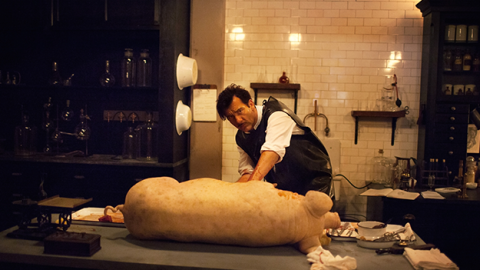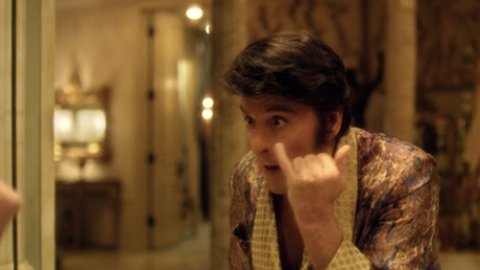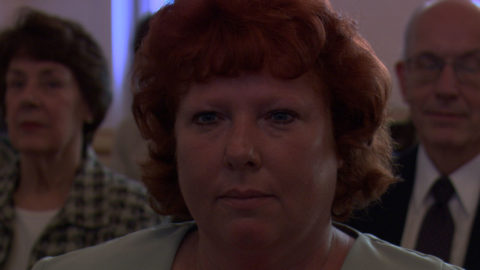
sex, lies, and videotape
“I always think that everyone else is having a really good time, and I’m not having anywhere near as good a time as they are.” —Steven Soderbergh, in Cannes, before winning the Palme d’Or
“Now I think that everyone else thinks I’m the one having this really great time and resent me for it.” —after winning the Palme d’Or
Federico Fellini, La Dolce Vita, 1960; Luis Buñuel, Viridiana, 1961; Luchino Visconti, The Leopard, 1963, and Death in Venice, 1971; Michelangelo Antonioni, Blow-Up, 1967; Robert Altman, M*A*S*H, 1970. And so on and so forth goes the parade of winners of the Palme d’Or at Cannes, the crossroads of cinema aspiration and art, right on down through Coppola, Scorsese, the Tavianis, Olmi, Schlöndorff, Kurosawa, Wajda, Wenders and Steven Soderbergh, sex, lies and videotape, 1989.
Soderbergh?
Originally slotted to screen in the Director’s Fortnight, the post-’68 sidebar event meant to house the upstart kids outside the main competition, Steven Soderbergh’s sex, lies, and videotape not only ended up in competition, it staggered Cannes by stealing three top prizes: Best Film, Best Actor for James Spader and the international critics’ prize.
It was Soderbergh’s first film, and at 26, he is Cannes’ youngest winner of the Palme d’Or. And yes, he came from Nowhere (Baton Rouge, LA), and the film cost Nothing ($1.2 million). And the buzz has moved from the inside of his head out into the world.
Past Palme winners have been swept away in the blue sea of May to wherever heroes dine in Elysian fields, not to be seen again save for the next day’s page one photos. Not Soderbergh. He hung out in the Majestic bar after the ceremony, looking like he was trying not to have the good time the sore losers were sure he was having. Gandhi swept ants out of his path; Soderbergh apologizes to water for drinking it.
The next day he made the obligatory trek to the Colombe d’Or restaurant out of town (Yipes, grownups!), but that night there he was having pizza in a sidewalk café with a Miramax vice-president who had confidence to spare and a honeymoon couple he didn’t even know and who looked like they’d only just met at the wedding. They’d have choked on their crust if only they’d seen what Soderbergh does to young marrieds in the most stunning update from the Sex Wars front since Mike Nichols weighed in with Carnal Knowledge two decades ago.
In that film, Nichols drew and quartered the male psyche—the project was limited to investigating the limited emotional development of the educated, upper-middle class American male. On the one hand was Art Garfunkel’s simpering worship of child-women; on the other, Jack Nicholson’s fire-breathing, rampart-battering assault on the trusting hearts of one Rapunzel after another. Sixties men—meaning college boys—shuddered for their futures: the choice was either down on their knees to virgins, or paying witch doctors to dance the hard dance.

Soderbergh arrives on the scene 20 years later to choreograph two men—and two women. Each pair starts out on different ends of the continuum that runs between appetite and hibernation, between the truthful self and the deceitful, between power and paralysis, between sex and love. Moreover, since Nichols’ time the Invisible Woman has died: what women accept in lieu of intimacy is as important here as what men do to avoid it.
The matched pair of scenes I liked best involve frigid wife Andie MacDowell, slipping upstairs in the middle of the night to observe the sleeping form of her husband’s long-lost college friend, James Spader, precisely as she comes to realize he has awakened something sleeping inside her; and her rising from bed to confront husband Peter Gallagher, with her fears he’s having an affair with her sister, Laura San Giacomo, whose voice sinks about three octaves lower than legal and makes the blood run hot.
sex, lies, and videotape sees the frontier of filmmaking not in the stars or the sequels but in the small European and sometime American independent traditions of investigating the way we love each other, or fail to. There’s no room for space cowboys here; nice guys finish with busted lips but whole beings.
There are hits and misses in the film—the character of the husband seems more an idea of a depersonalized twit rather than the complicated force that might attract one woman to the altar and her sister to bed. No dinner could survive a husband saying about his wife, “Usually, Annie achieves a critical mass with the salt…” Their mismatch is too apparent, and so the dice seem too loaded with dynamite to warrant surprise when the explosion comes in the third act.
But if Soderbergh has knit the film together too tightly at times with lines of dialogue that set up the next move or visual signs that echo—in the pivotal moment the wife shows up in the same black t-shirt and blue jeans favored by the friend—he has tried very hard to be very real. He has showed us our skin, how it wants to be touched with truth and beauty and eternity, and the consequences of that time called our twenties. That is to say, it is about the end of the first time, and the beginning of wisdom. sex, lies, and videotape is not Bertolucci’s Last Tango in Paris, which mixed myth with the lure of redemption, but then what is?
Perhaps what disarmed the jury in Cannes, chaired by Wim Wenders—whose own masterpiece, Wings of Desire, is a hymn to the reunion of men and women, of the two Germanies, of the past and the present—wasn’t simply Soderbergh’s mapping out a small square of the terrain. But, like Wenders, he too wished aloud that in the end we find each other and heal.—H.J.

Your film is about the way people leave each other, the way they escape or drive each other away. Is this drawn from personal experience?
Yeah, I guess so. I drove the most important woman in my life to leave because I didn’t want to be in the relationship but couldn’t just say, “I don’t want to be in this. I want to be out of it.” There was nothing wrong with the person that made my life uncomfortable, I just wasn’t ready to deal with the responsibility. So I was very deceptive about how I got out of it. And then once I was out of it I couldn’t even allow it the dignity to die properly. I kept stringing it out and not letting it go and then I got involved with some other people and—it was just a mess. I look back on it and I’m stunned that I had turned into the kind of person I despise.
In the film I tried not to be judgmental. However you act, accept the consequences. I don’t have control over how other people act. And I don’t like movies where a relationship, which has a lot of grey areas, is presented definitively as bad. If you’re dealing with a cop movie, maybe you need to have some definite delineations. But then again, maybe not.
Were there certain movies that served as guideposts?
No, not really. There were two problems when we were trying to get the film off the ground. One was that it didn’t synopsize well. And there were no references I could make to other films in that classic Hollywood shorthand to bring an image to somebody’s mind. I really didn’t know how to describe it. There were films that I grew up with—The Last Picture Show or Five Easy Pieces—about relationships, but they were about different things.
It was interesting to see the male and female psyche put up onscreen and watch you chart the way for a meeting ground. There is a kind of movement in it…
I’m a big believer in movement, any kind of movement, as long as you feel as though you’re moving somewhere. There have been times in my life where the movement turned out to be backward but I needed movement. When we talk about women leaving men more often, maybe it’s just a realization that they don’t have to settle any more. I don’t know how right it is for you to ask someone to change for you. You’ve either got to say, “Fine, I can live with you,” or you’ve got to get out.
I approach relationships now with a longer view than I used to. I didn’t used to have a view at all. Each day it seemed to just spring into full bloom that day. And now I slow down—I used to get involved really fast. You know, sex clouds everything. It’s hard to be objective when a physical relationship is pleasing. I’ve been very conscious of keeping sex out of the early stages, and I’m convinced this is something substantial. It hasn’t really worked yet.
The film is, up to late August, the sum total of what I’ve been able to put together and figure out.
After we finished the film I went to New York to reestablish contact with somebody—the relationship that led me to write sex, lies… And it was good, we were able to be friends. We went to see Italian-American Reconciliation [written and directed] by John Patrick Shanley. The people were all compulsively verbal and emotional. That’s very Italian. By comparison my film seems so repressed. It’s all about people who will not say what they’re thinking unless they’re really pushed into a corner and poked. I realized how much I was like the film, how much I’m still struggling with the distance I feel between myself and other people, and my feelings, and how difficult it still is for me to feel and not instantly analyze.

What did you think would happen to you if you told lies?
Pardon me? What do you mean? When I told them what did I think?
Why do you think you began lying in the first place?
I don’t know. The lies were specific only to my personal relationships with women. If I’d been able to conduct my personal life the way I conduct my professional life, I’d be in great shape, because I’m very straightforward professionally.
I can theorize for days about how I was lying to the people that I was involved with. Part of the larger problem has to do with my relationship, or lack of a relationship, with my mother, who is a great lady, a nice lady, I just don’t have a relationship with her. It’s just not there.
I was very intent on getting acceptance and approval. And then once I got it, I went somewhere else and got it. I’d think, “Gee, if I can get such and such to like me, then I must be okay. I must be attractive. I must be dynamic.” And, of course, once you hooked her you’d look for somebody else. It just fed itself.
And then I compounded it with stupid, romantic notions of self-destruction. The starving artist phase is bullshit. You know, it is not fun. At some level, I was interested in how low can I go, how far is this going to go? And then I realized it could go on indefinitely. I looked for the bottom and realized there wasn’t one. It was just a spiral until I either dropped dead or got hit by a car. That’s what really woke me up. And I put a very cold and abrupt stop to all of it.
How’d you do it?
I confessed to everyone and quit having contact with anybody. Gradually, when I started feeling a little bit better, piece by piece I reestablished contact. I was sorry I had hurt them and put them through a difficult situation that I was trying to fix in private. It’s taken a long time.
Did you do this on your own?
Yeah. I had earlier tried to go into therapy and it was a mess. I lied to my therapist. I went to three sessions and walked in one day and said, “Look, I’ve got a handle on this. I’m making real progress and I feel really good about myself.” I mean, I just lied my ass off. And he only charged me for 15 minutes. He said, “That sounds great.”
Was this down in Baton Rouge?
Yeah. Maybe the therapists aren’t good down there. I can’t hold him responsible, I lied to him constantly. How could he help me?

Maybe he knew anyway.
I hope so, for his sake.
It sort of becomes a game. Did you think the women ever knew you were lying?
Yeah, one of them did. The most important one did. But, boy I was wriggling. I could backpedal like you wouldn’t believe.
Why’d you start?
I had great parents. My parents are divorced but it was not an ugly thing. I had a very good upbringing. Yet appearances were important and things were sublimated to maintain a certain image.
I told everybody what I thought they wanted to hear. It was never consistent because everyone wanted something different. It got to a point where I thought this doesn’t work. It’s stupid that one organism consisting of ten zillion cells thinks it can relate to another organism that has ten zillion cells. But that was just in a particularly dark period and now I understand how it can work.
How were you able to get somebody to believe that this could be a picture?
Well, on the one hand it may seem like a risk. On the other, remember that we’ve got four relatively young people drenched in sexuality in a film that can be made for $1.2 million. It was a risk only because we had no domestic theatrical distributor and the video was already owned, which is the big thing that you entice a distributor with.
How did you get it going?
It was Bob Newmyer’s at Outlaw Productions contact at RCA-Columbia Home Video that got that deal happening. And Nancy Tenenbaum negotiated the deal with Overseas Entertainment. The script was pretty much there, and John Hardy of Baton Rouge was going to produce it. I’d taken the script first to Nick Wechsler. Nick took it to Musifilm, but they dropped out. It was Bob who thought maybe I had something that more than ten people would see. His tastes are very commercial and mainstream in a good way. When he asked to read the script, I said, “Bob, it’s not that you’re stupid, it’s just not your kind of movie.” He read it and said, “I couldn’t put it down. I had to find out what was going to happen.”
How did you know that women get up in the middle of the night and watch us while we sleep?
I don’t know. Even when I was being a pinhead I still had my ears open. I’m pretty observant by nature.
Tell me a little bit about video and why you used it as a metaphor for distance.
Video is a way of distancing ourselves from people and events. We tend to think that we can experience things because we watched them on tape. For Graham [Spader] this was an aspect of myself taken to an extreme measure. He needs the distance to feel free to react without anybody watching, which, I guess, is the definition of voyeurism, even though I think voyeurism has mostly negative connotations. I guess it should. I don’t know.
That’s show biz.
Well, yeah, I guess I always think of Michael Powell’s Peeping Tom [1960]….
Yeah, but sometimes Spader had the annoying moral superiority of a priest at confessions.
I never thought of it that way. Only because I had a complete lack of religious upbringing. My parents were both lapsed Catholics and so I grew up believing whatever I wanted to believe.
Did you live with your mother once they divorced? Or your father? Did you go back and forth?
Well, kind of. My parents physically separated when I was 16, and when I was 17 I graduated high school, so I left to go to Los Angeles for a while and I eventually came back but lived outside the house.
What made you want to be a filmmaker?
I had seen a lot of films as a child. My dad would let me see anything.
What does he do?
He’s a professor of education at LSU. And he enrolled me when I was 13 in an animation class. I could draw really well but it immediately became apparent that it was too much work for too little result. I made two things that were each six seconds long and said, “This is bullshit.” And so I just started shooting.
I’d take the camera off the copy stand and go shoot live action and I was good. I had four years of access to equipment doing all phases of everything with no pressure. I feel bad for these people in film schools who get chosen to make a film. In L.A. they have their projects screened in front of the industry. Your career could be over before you’re a junior in college.
I learned at 15 that I can’t make films about other films. And after making a couple that people actively hated, I learned by trial and error to make things that are more personal. Now the stakes are so high you can’t learn. Super-8 was a great format. I’m sorry it’s gone. I made things technically every bit as good as sex, lies… when I was in high school.

Did you rehearse a lot on sex, lies?
We rehearsed for a week before we shot and I rewrote dialogue. I tried to make sure that I didn’t let the camera dictate the performance. I’d walk on the set, we’d block the scene, and then I’d decide the camera angles. Figuring out where to put the camera is just insanely easy—if you watch, it becomes self-evident. To do it the other way around seems really stupid.
You hire the best possible people and you let them perform. I tried to help. Most of the time they were doing things better than I could ever have thought. There were a couple of times where I’d just shut everything down and the actor and I would sit there for a half an hour and talk it through until we were both comfortable about what had to happen and why. I don’t know that I’ll be able to do that on the next film.
Some people say, “Gee, I want to know more about why they’re the way they are.” I kept their backgrounds to a minimum because there’s a whole other film there.
When John [Peter Gallagher] sits down and watches the videotape of his wife, what does he see?
You should ask Peter. John was the least well drawn of all the characters, and he was unafraid to look terribly unsympathetic. He came up with a lot of stuff—the plant bit, etc.
Why did you lowercase the title?
It just looked better. I looked at it in capital letters and it looked wrong. Also, I have two commas in it. I’m with the Chicago Manual of Style on that one.
It really just looked better?
It does aesthetically.
It wasn’t e.e. cummings?
No, I just thought aesthetically it looked better. That’s all I care about, how things look.
But that’s not in the Chicago Manual.
What lowercase? They probably specifically rule against it. But I can go either way on the comma thing, and in this case I want two commas.
So is Cannes scary or fun or what?
It is so weird. I can’t explain to you how weird it is.
Are you scared?
I don’t know. It was beginning to dawn on me this afternoon: Denys Arcand has a film here, Bertrand Blier, Spike Lee, who I like a lot. And then I flipped through the program and there was our page with my name and, you know, it was in French. I began to really shake.
It feels like it’s more exciting happening to somebody else than me. I feel like Spike Lee’s having a much better time. I feel like it must be much more exciting to be Spike.

Why do you think that other people are having more fun?
I always feel like other people are having more fun wherever I am. Especially at parties. Maybe they are. It’s like the Stephen Crane story about the paranoid poker player, thinks he’s being cheated. He gets into an argument with another guy, and the guy shoots him dead. And then we find out that he was being cheated. But the point of view is that the guy has completely lost it. And so now I have the fear that everybody else is having more fun than me. Maybe I’ll be at a party someday and accidentally back into the room where everybody is that’s having a great time.
Well, everybody needs to be mirrored and told that they did good stuff.
Too much of it’s harmful. I realized I could just do the festival circuit for the next 8 months. You walk in, they treat you like royalty and everything you say—to your face anyway—is taken very seriously. And that’s horrible. It’s like being a rock star. That’s why I’m trying to get out of L.A. quickly.
Where are you going to go?
To Virginia. Charlottesville. Louisiana is going down the toilet at an amazing speed and I just can’t go back and live there anymore. I have time to think. I want to adapt and direct this novel that we set up at Universal.
What’s it called?
The Last Ship by William Brinkley. It is sexual tension taken to an extreme you can’t imagine. It’s about men and women on a Naval destroyer that survives World War III. Once they find some place habitable, they start over again. But since there are three times as many men as women, the women have all the control and draw up a plan for how this is going to work. After sex, lies… I thought, “Where do I go with this subject now?”
Reading The Last Ship was great. It’s perfect material for me to do, I thought. And so Bob Newmyer at Outlaw bought the book last year and was on the verge of signing to do it as a mini-series. And I said, “Give me four weeks to get a big producer attached.”
I met with Sydney Pollack, who had seen sex, lies… and he agreed to be executive producer. He pitched it to Universal—it was like playing with Michael Jordan, and you’re the rookie. You give Michael Jordan the ball and he dunks it. You know. I walked in to the room, I said ten words, Pollack pitched for 15 minutes. The guy goes, “Great, let’s do it.” And we leave. And that was it.
Do the men survive?
Yes, they do. Although the American men are sterile, as we find out. They’ve been irradiated. But a Russian sub shows up at this island and they’ve been underwater the whole time, so they can….
They’re pretty fertile.
Yeah, and they haven’t seen women in a long time.








